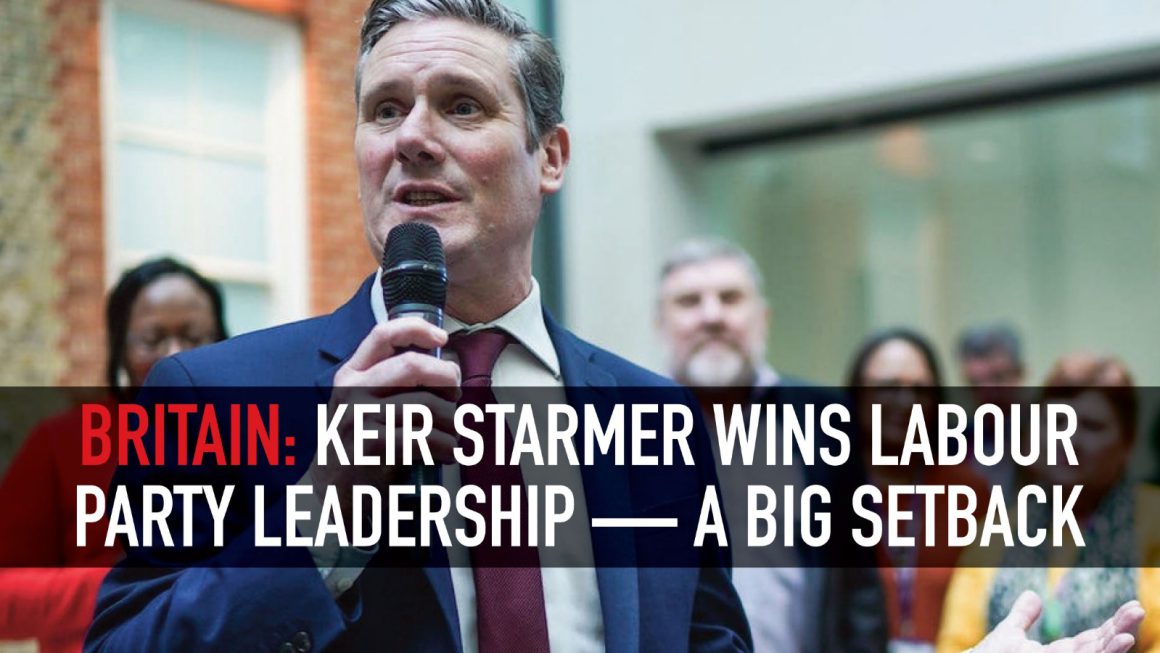The victory of Keir Starmer in the election to choose the Labour Party leader, with Angela Rayner as deputy, is undoubtedly a major setback for the left and has been greeted by much fanfare by the main mouthpieces of the capitalist class like the Financial Times.
Socialist Alternative argued for a vote for Rebecca Long-Bailey for leader and Richard Burgon for deputy leader. We did so on the basis that these two candidates were the most likely to defend the left policies of the 2017 and 2019 elections and to develop democratic accountability of the party’s public representatives. Starmer’s victory, by a very wide margin, indicates that it is now likely that there will be a generalised retreat from the policy gains the left has made under Corbyn’s leadership.
While Starmer may have pledged to maintain support, usually in a limited or caveated way, for some of the popular pro-working-class policies in the 2017 and 2019 manifestos (primarily as a cynical way of grabbing the votes of former Corbyn supporters) his acceptance speech should leave people in no doubt as to the real agenda his leadership represents.
This is a time of calamitous public health and economic crisis — in which the Tory government has left our NHS disastrously under-equipped and under-staffed, has callously and incompetently failed to act to stop the spread of the virus until it was well underway, and is undoubtedly already considering how it can best foist the bill for the economic collapse that this has triggered onto working-class people. But rather than going on the offensive, Starmer instead used his victory speech to essentially call for increasing unity with the government.
He is quoted as saying: “In the national interest, the Labour Party will play its full part. Under my leadership, we will engage constructively with the government. Not opposition for opposition’s sake… but with the courage to support when that’s the right thing to do”.
No to the ‘national unity’ trap
But there is no unity of interests between the working-class people suffering deeply as a result of this crisis and the capitalist and billionaire class whom the Tories exist to represent. Millions of key workers are currently keeping our society going despite years of pay restraint and cuts. They are being forced to do so with inadequate protective equipment, in underfunded services that are on their knees. For Starmer to use his victory speech to pledge to work ‘constructively’ with those responsible for this dire situation, rather than to be rigorously holding them to account for these failings and mobilising a fightback, speaks to the real essence of his political approach.
Starmer is not Corbyn in a smarter suit as some have attempted to claim. More sharply than perhaps any other issue could have, his response to the Covid crisis reveals the true character of his politics. His agenda in this election was to once again make Labour ‘safe’ for capitalism. Right now, that aim demands an approach that helps guard against the potential for mass revolt that exists as a result of the Coronavirus crisis — a crisis severely exacerbated by 30 years of neoliberal capitalism. It requires him to essentially stand with and act as a shield for the Tories. And that is a role which he appears all too willing to play.
We should expect that, in attempting to make the party ‘safe’ again, Starmer will move towards purging the party internally of all the remnants of Corbynism. There will not only be, for example, a firm block placed on any moves towards open selection of MPs. It is likely that he will also move to rapidly escalate a witch-hunt against Corbyn supporters who remain within Labour.
Sir Keir is a solid figure of the establishment and a millionaire, making him an obvious candidate of the capitalist class. In the final days of the leadership campaign he was even endorsed by George Osborne, the former Tory Chancellor. The bosses’ press claim that, unlike Corbyn, he is ‘electable’. They of course placed Labour’s defeat in the recent general election firmly at the door of Corbyn and the party’s left manifesto.
In reality Labour’s policies on pay, public services and nationalisation were overwhelmingly popular and with a more dynamic and focused campaign, the advances Labour made in 2017 could have laid the basis for victory in 2019. A key factor in Labour’s failure lay in the high profile and even front bench figures, including Starmer, who undermined Corbyn and attempted to shift Labour’s position towards support for a second Brexit referendum. This played a central part in the collapse of the Labour vote in areas which had voted Leave in 2016 and the loss of key seats in the North West, North East and East Midlands. Many Corbyn supporters will rightly feel, with some bitterness, that Starmer was in fact a chief architect of Labour’s election defeat, who now as a result inherits the crown.
Although Long Bailey was clearly the closest to a ‘continuity’ Corbyn candidate, her campaign was not helped by her denial that she in fact was. In the course of the campaign enthusiasm for her candidature waned, despite some promising signs where she has correctly talked about supporting workers in struggle and open selection But overall, her approach was deeply defensive, based on an acceptance of large parts of the anti-Corbyn narrative being pushed by the Blairites and their allies in the capitalist press.
There were no mass rallies (the majority of the campaign was conducted prior to the Covid-19 lockdown) and little enthusiasm amongst many of the people who had previously supported Corbyn. This was compounded by a whole number of concessions that were made to the right.
Many on the left of the party feared she would drift to the right under pressure, and this impression was confirmed by her decision to accept the ‘ten pledges’ demanded by the right-wing British Board of Jewish Deputies in relation to antisemitism. This included accepting a definition of antisemitism which could be used against those who criticise the Israeli state, and promising to hand control of disciplinary procedures to an outside body, rather than an elected committee within the Labour Party. Long-Bailey, from the start, should have twinned commitments to fighting antisemitism with a rejection of any idea that the Board are the sole representatives of Jewish people in Britain and exposing the right-wing’s exploitation of it for political gain.
An alliance with Richard Burgon, rather than Angela Rayner, who despite the impression of being a left candidate, is actually a stalwart of the right would have given voters a clearer ‘left vs right’ choice of the team they wanted to lead the party.
Starmer’s victory will undoubtedly shift the balance of forces on the NEC and in the party apparatus.There will be a battle for the left to retain its slender hold on the NEC and it is possible that key figures such as Leader’s Office Director Karie Murphy and Party General Secretary Jennie Formby will be replaced, along with others. The Blairite wing of the party will be looking to grab control, reverse the gains the left has made, and extract vengeance.
Their thinking was revealed in published advice to Starmer from John McTernan, Tony Blair’s Director of Operations from 2005–07:
“Continuity Corbynistas like Rebecca Long Bailey and Richard Burgon must be exiled to the back benches for the rest of their parliamentary careers, which should be as brief as possible. Victory has to be absolute.”
McTernan clearly has Unite general secretary Len McCluskey in his sights too: “Until Unite has a sensible leader you will not be as secure as you should be.” Tony Blair once said about party discipline: “You only have to break one of their legs, not both of them.” Actually, the trick is to make people believe you are willing to break their legs’.
The viciousness of these remarks is a reminder to the left of the hatred the pro-capitalist Blairites harbour towards us — something which we have pointed out continuously, calling on Corbyn to take democratic measures against the Blairites, such as mandatory reselection, understanding that no amount of ‘reason’ would placate them.
The right’s approach is to protect big business at all costs, under the guise of appearing ‘statesman-like’. There have already been calls for the new leader to join in a ‘government of national unity’. It would be disastrous for any Labour leader to join a government which has systematically run down the health service and attacked the conditions of working-class people consistently over the past decade — and which is now being exposed.
It’s possible Starmer may not move immediately in that direction. He could even hesitate to fully unleash a witch-hunt against the left, given the size of the mass membership and the respect and loyalty many feel for the departing Corbyn and his heritage, though the scale of this victory could make a cautious approach by Starmer more unlikely. The Blairites will be cock-a-hoop and confident that they can turn the clock back.
To actually resist this, it would be necessary for the left to fully abandon the utterly failed approach of the leadership of Momentum and other parts of the leadership of the Labour. Since 2015, these figures counselled retreat in the face of attack. They argued for conciliation with the right — which.did not once relent in its hostility towards Corbyn nor in its, ultimately successful, attempts at sabotage. Only if the left inside and outside Labour, including in the trade unions, were reorganised on a clear fighting basis, with a socialist programme, would it be possible to push back against the march to the right. Anything short of this will fail.
Indeed, it is not a principle that political representation for working-class people in Britain must come through the Labour Party. In fact, the elevation of this idea to a fundamental was one of the weaknesses of Corbyn’s approach.
Lessons for the Labour left and the wider workers’ movement
We must be emphatic that socialist policies must not be either abandoned or soft-pedalled. It is only by clearly arguing for socialist policies that we can begin to address the enormities of the climate crisis, the Covid-19 outbreak and the looming recession.
In fact, Corbyn’s programme did not go nearly far enough. The coronavirus crisis is starkly revealing the inability of the market, despite all humanity’s technological achievements, to produce and distribute what is necessary to meet human need — hampered as it is by the demands of profit. Only a full socialist programme — demanding public ownership of the major banks and monopolies that dominate our economy, and democratic working-class control to allow the planning that’s needed to properly provide for everyone — is an adequate response to this crisis.
Nor is it the case that the left must build bridges to the right, as John McDonnell mistakenly thought when jokingly offering to go for a friendly cup of tea with Peter Mandelson. Quite the opposite.
The right within Labour is organised through half a dozen different organisations — Progress, Labour First etc. Working-class people need an organisation which can drive forward the struggle for a party that gives voice to, opens its ranks to, and provides a lead to, the trade unionists, social movements, community activists and young people who will enter the road of struggle against the Johnson government. We should be prepared that, in order to win consistent and democratic political representation for working-class people, it will be necessary to decisively break with the Labour right. This is something which could ultimately necessitate the founding of a new party for workers should the right’s grip on the apparatus and structures of Labour become consolidated, as seems increasingly likely.
Momentum played a role in mobilising for mass canvasses last year and in 2017, but overall the left has been ill-served by its leader, Jon Lansman’s disastrous strategy of engaging in organisational manoeuvring, conciliation with the right and retreat on key questions, rather than open political struggle against the Blairites.
The leadership of Momentum, as well as rightwards-moving ‘lefts’ such as Paul Mason have shown themselves completely incapable of charting a way forward -and their role should not be forgotten. It has been an unfortunate trait of the large sections of the left in the Labour Party, and sadly we have to include Jeremy Corbyn, John McDonnell and Rebecca Long-Bailey in this, that they have failed to mobilise the mass membership to defeat the right wing, falsely seeking ‘unity’ with the right wing. This policy has helped paved the way for the victory of Starmer.
Within the Parliamentary Labour Party there will be a small, but potentially hardened and more forceful left. Richard Burgon’s campaign sharply raised the issues of public ownership of some of the privatised utilities, party democracy and denounced the 2016 ‘chicken coup’ plotters to great applause. However he did not commit to public ownership of the banks and other financial institutions, whilst also not being clear on the issue of Labour councils and the need to fully resist the cuts. Left MPs such as Richard Burgon and Zarah Sultana will need to discuss urgently how a rightward march in Labour can be resisted and organised against.
In the wake of the election defeat, and the crowning of a new ‘centrist’ — in reality, right-wing — Labour leader there will be much soul-searching in the Labour Party and some will leave the party in despair. While a battle will undoubtedly continue within the Party, with many good lefts doing what they can to stand against a Blairite counter-revolution, it is clear that for many workers and young people seeking to fight Tory austerity, and capitalism’s deep health, climate and economic crises, Labour under Starmer will appear far less appealing as a vehicle for struggle and change.
What is most important is that activists draw the correct socialist conclusions from the experience: that Corbyn’s leadership lost out, not due to any excess of socialist policies, but because it stopped half way in the struggle to transform Labour into a mass fighting socialist party.
The short-lived era of “Corbynism”, represented both at the head of the Labour Party and in the historic Leftward shift among the hundreds of thousands of young people and workers who it inspired, will leave a lasting impact. While many will be disappointed, even demoralised, countless ‘Corbynistas’ of 2015–2020 will surface in the months and years to come as class and community fighters, amid the storms of the current capitalist crisis.
Crucial in the next period, will be the building up of a revolutionary socialist core, which understands the need to break with the drastically failing capitalist system, and the need to fight for the transformation of society. We believe that Socialist Alternative offers an analysis, a programme and perspective that addresses the multiple crises our world faces and we urge you to join us.












